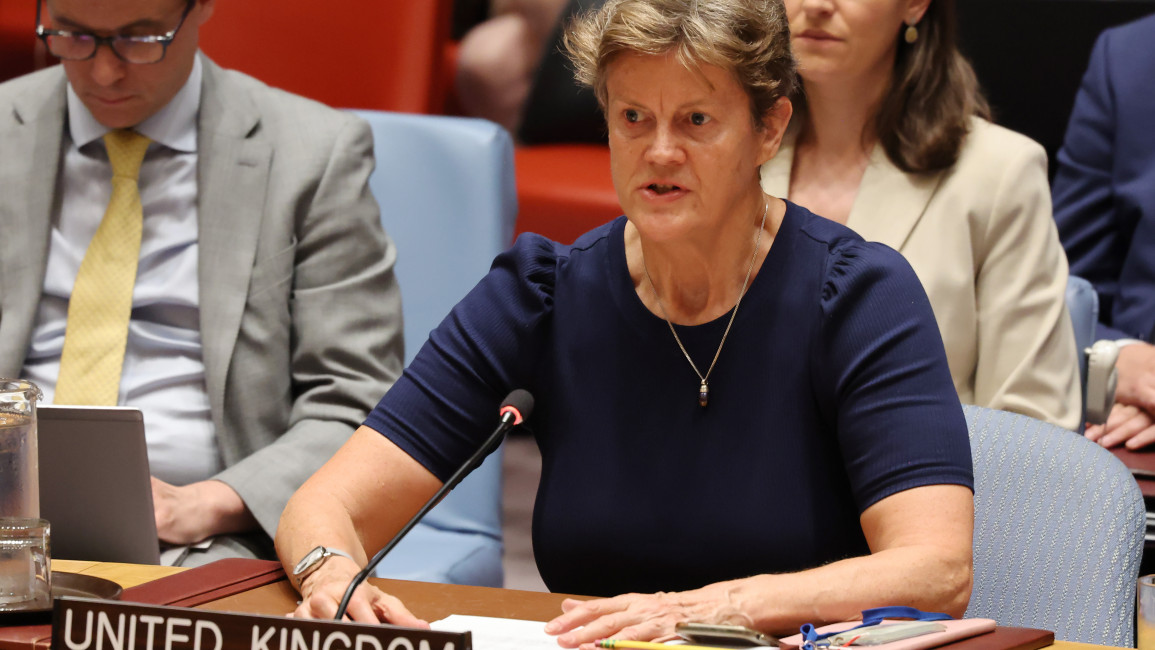Why did UK and other states abstain from UN resolution on Israel's occupation?
The UK was among 43 member states who abstained at the United Nations General Assembly vote on Israel's occupation of Palestinian territories, choosing not to back the resolution despite overwhelming evidence of Israeli violations of international law.
Member states on Wednesday voted 124 in favour of resolution demanding Israel end its unlawful occupation of the Palestinian territories. The resolution details that Israel should immediately cease all new settlement building, withdraw its military forces, and dismantle the wall inside the occupied West Bank.
The resolution was opposed by 14 countries, including the United States — Israel’s closest and oldest ally. Argentina, Hungary, Fiji and Tonga were also among the opposing states.
Palestine's ambassador to the UN Riyad Mansour called it a turning point "in our struggle for freedom and justice", while the vote was condemned by Israel.
Palestine took a seat at the UN General Assembly for the first time last week and the resolution was tabled by Palestine when it was granted "permanent observer state" in May.
The UK's decision to abstain isolates it from several friendly European nations who backed the vote, such as France, Spain and Ireland. The latter two nations are amongst a small group who announced their formal recognition of the State of Palestine earlier this year.
Speaking after the vote on Wednesday, the UK’s ambassador to the UN said the decision not to support the resolution was not because it is against the findings of the International Court of Justice, which decried Israel’s 57-year occupation was unlawful.
Barbara Woodward said that the resolution did not provide "sufficient clarity" on advancing a negotiated two-state solution.
"The resolution does not provide sufficient clarity to effectively advance our shared aim of a peace premised on a negotiated two-state solution: a safe and secure Israel alongside a safe and secure Palestinian state," Woodward said.
A two-state solution to the Israel-Palestine conflict has always been the UK government policy, a vision described as being "a safe and secure Israel alongside a safe and secure Palestinian state".
Woodward said that the UK is clear that "Israel should bring an end to its presence in the Occupied Palestinian Territories as rapidly as possible” and called for the reunification of the 1967 borders which refers to the territory before Israel’s annexation after the Six Day War.
The UK’s decision comes as the new Labour government sets out its foreign policy agenda on the Middle East, though analysts have said it is unlikely to stray much from that of the previous Conservative governments.
Since taking office in July, Foreign Secretary David Lammy has taken steps which indicate a marginally harsher approach to Israel, including suspending some arms export licenses to Israel over concerns of international law breaches.
But the decision not to back the UN vote against Israel on the world stage sits in contrast with the government’s advocacy of international humanitarian law.
While the UN vote is not legally binding, it marks a historic milestone in the path towards Palestinian sovereignty and comes against a backdrop of growing international condemnation of Israel’s brutal war in Gaza and its military raids in the occupied West Bank.
Among the other countries to abstain included Ukraine, India, Australia and Germany – indicative of some global ties with states often clubbing together in these votes.
It is not the first time that India has abstained in a General Assembly vote on Israel’s occupation of Palestine.
Observers say that the country has strengthened ties with Israel during the governance of Prime Minister Narendra Modi, who has been accused of promoting anti-Muslim polices in the Asian state.




 Follow the Middle East's top stories in English at The New Arab on Google News
Follow the Middle East's top stories in English at The New Arab on Google News
![A group of Palestinians, foreign and Israeli activists gather to participated in an olive picking event on the land in the town of Battir, which is under threat of confiscation by Israel in Bethlehem, occupied West Bank on 8 November 2024. [Getty]](/sites/default/files/styles/image_330x185/public/2182930803.jpeg?h=199d8c1f&itok=__0LgGsa)

![People gathered around the rubble of destroyed houses to search for survivors [Getty]](/sites/default/files/styles/image_330x185/public/2024-11/GettyImages-2184733820.jpg?h=199d8c1f&itok=NiM1LO2f)